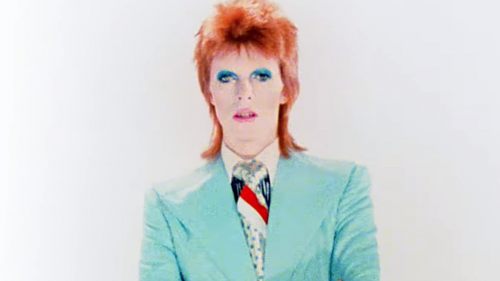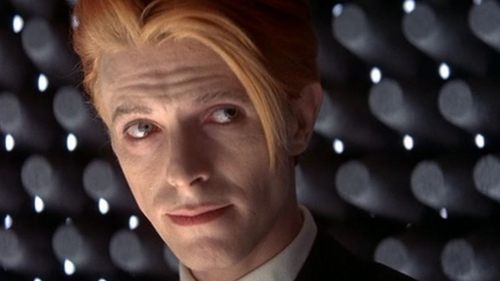The Man Who Inspired The World
Editor's Note: This post originally ran in January of 2016, in the wake of David Bowie's tragic death. We're reposting it here today in observation of his birthday.
David Bowie’s effect on pop culture refused to be bound by artistic convention or medium. Two dozen plus albums is one thing, but Bowie worked in film, theatre (as an actor and a writer), prose, and painting as well. There were few art forms Bowie didn’t touch directly, but his artistic shadow stretches further than that. To really understand his place in pop history, one must witness the impact he had beyond his own work.
I never saw Bowie play, but I have seen multiple other artists play his songs, which says a lot on its own. But as often as his songs have been covered, his chameleonic transformations into different stage personas have been even more influential. Hell, it’s almost a pop-music cliche now to transform one’s visual and/or musical identity from album to album - see Katy Perry, Prince, Miley Cyrus, Lady Gaga - and to a degree, that began with David Bowie.
Few bands are more reliant on visual identity than Marilyn Manson, and the band has unsurprisingly cited Bowie as an influence more than once. Its frontman has gone from antichrist to alien to burlesque MC to blues man, accompanied by appropriate musical changes. The Smashing Pumpkins went through similar visual and aural transformations, and like Manson created a fictitious, fantastical alter-ego band (Glass and the Machines of God in the Pumpkins’ case; Omega and the Mechanical Animals in Manson’s) in tribute or at least subconscious homage to the two bands’ common antecedent.
Other musicians nod to Bowie more explicitly. The Flight of the Conchords episode “Bowie” featured not only a terrific parody song, but also brought in Bowie as a character. The rock legend visits Conchord Bret McKenzie in a series of dreams to give him advice on his body image issues. After a series of Dickensian visitations and further hijinks, the episode concludes with the “Bowie In Space” itself, a four-part epic effortlessly imitating Bowie’s vocal style and freeform song structure.
As detailed in Clement’s own David Bowie eulogy, the Conchords attempted to snag an appearance from Bowie himself, but having just filmed a cameo for Extras, he had little interest in performing as a version of himself. But his presence would have been a distraction. Instead, Clement plays the character himself, appearing as Ziggy Stardust Bowie, Ashes to Ashes Bowie, and Goblin King Bowie despite bearing very little resemblance to the late rocker. The spirit is there, and that’s what’s important - not a celebrity cameo. And though McKenzie characteristically blows its execution, Bowie’s advice to “do something absolutely outrageous” feels like the right thing for the legend to say - even if he didn’t want to say it himself.
It feels inevitable that a Bowie biopic will be made at some point, but it also feels redundant; the best possible Bowie movie has already been made, and it’s called Velvet Goldmine. Cribbing from Citizen Kane as much as it does the glam rock era, Velvet Goldmine follows Christian Bale’s gay journalist Arthur Stuart as he seeks to unravel the story of a missing rock icon - one who recently had his alter ego assassinated.
Based around fictional, inscrutable glam rock icon Brian Slade and his doubly fictional Ziggy Stardust parallel Maxwell Demon, Velvet Goldmine doesn’t adhere to Bowie’s story exactly, but it absolutely captures what Bowie meant to a generation (generations, even!) of weirdos and freaks. Todd Haynes’ nonlinear, lyrical movie understands the importance of Bowie’s fluid identity not just to his work, but to the LGBT scene and fans seeking an identifying figure. Slade’s gender-bending style allows Stuart to express himself and ultimately come out, amidst countless others doing very much the same thing.
Bowie reportedly disliked the film’s script, refusing to allow his songs to play in the film and mandating a rewrite to less closely follow his life. In a similar way to the Conchords episode, that only improves the film. Rather than cribbing directly from its obvious subject, it draws from everything around him: his influences, his contemporaries, the culture he helped shape. It celebrates other icons of the period - Iggy Pop and Lou Reed, in Ewan MacGregor’s Curt Wild; Little Richard, in Jack Fairy - and is littered with references to and cuts from the likes of T.Rex, The Velvet Underground, Brian Eno, Slade, Roxy Music and more. Caught somewhere between Oscar Wilde and space aliens, it positions glam rock as the ultimate expression of sexual and identity experimentation.
Fittingly enough, despite disappointing initial performance, Velvet Goldmine earned its own cult following post-release. Haynes says it’s the film of his that “seems to mean the most to a lot of teenagers and young people,” and he’s not far wrong. The film was a favourite amongst my friends as a teenager in the early 2000s. In a small way, it wasn’t just about Bowie-led identity revolution; it was that revolution, for a different generation.
Bowie’s songs have, of course, appeared in countless movies, from The Life Aquatic to Cat People to The Martian. They have become the titles of some TV shows, like Life on Mars, and thematic backbones to others, like American Horror Story. But the best Bowie needle-drop of all - one of the best in the whole of cinema - occurs in Leos Carax’s Mauvais Sang.
Mauvais Sang is a heist film with a hint of dystopian sci-fi that subverts its synopsis (gangsters steal a treatment serum for a new STD which only affects loveless sex!) by spending most of its time as a gentle, intelligent meditation on love. But even that gets broken up occasionally with Carax’s trademark bursts of energy. None is more energetic than the scene where protagonist Denis Lavant turns on the radio and runs down the street to David Bowie’s “Modern Love.” It completely upends the pacing out of nowhere, a raw expression of emotion in the way only music and movement can fully achieve. Playing like an interpretive dance number, it reflects Lavant’s character arc, as his physicality goes from the agonised stumble of immaturity to the cartwheeling sprint of full-bodied emotion.
Mauvais Sang’s “Modern Love” scene is the kind of magic that cinema is made for. Carax’s cinematic boldness, Lavant’s acrobatics and Bowie’s pop melancholy meet alchemically, creating a sequence whose surface-level simplicity conceals great meaning. Love, it posits, is the energy we run on, even if it’s unrequited and hopeless. It’s such a great, life-affirming scene that it was successfully lifted wholesale twenty-five years later by Noah Baumbach for Frances Ha.
Even video games have been made richer for Bowie’s presence. Bowie himself appeared in and wrote music for Quantic Dream’s strange sci-fi adventure Omikron: The Nomad Soul (currently available for free), but over in Japan Hideo Kojima filled his Metal Gear Solid series with Bowie homages to a near-obsessive level. Metal Gear Solid 3 features a character called Major Tom and a fictitious film entitled My Mother was a Teenage Spider Queen From Mars, and the series’ fifth instalment opens with Midge Ure’s cover of “The Man Who Sold The World.”
It doesn’t end there. In reference to Bowie’s eighth album, MGSV places the player in command of a military force called the “Diamond Dogs,” and even names their eyepatched wolf-dog after it. (That’s true!) You could also attribute the game’s nontraditional masculinity to Bowie. Many of the characters take after his various stage personas, and its male leads display considerable sexual ambiguity and homoeroticism. Plus, as Riley MacLeod writes on gaming criticism site Offworld, stealth games offer an alternative, queer masculinity, one that is “sleek, illusory, sensitive, and self-reflective.” And no series embodies stealth gaming more than Metal Gear Solid. Is it linked to Kojima’s adoration of Bowie? It’s hard to tell for sure, but it’s unlikely Kojima wasn’t at least subconsciously aware of it.
Finally, it’s hard to imagine a space-age pop consciousness without David Bowie. From songs like “Space Oddity,” “Starman,” and “Life on Mars,” to the whole-cloth transformation into alien rock god Ziggy Stardust, Bowie brought sci-fi to music in a big way. Commander Chris Hadfield’s orbital cover of “Space Oddity” wasn’t just a fun twist on the song; it represented Bowie coming full circle, finally being played in the realm from whence many thought he must have come. If Star Trek was the television that made us look to the stars, and 2001 was the cinema, then Bowie was likely the musician. It’s fitting, then, that the MIRA observatory in Belgium this week registered a new constellation, located “in the vicinity of Mars,” in tribute to him.

It’s hard to believe Bowie was only 69 when he passed. Such a pillar of music and culture, it felt like he'd been around - and would be around - forever. Few people got to know Bowie the man; millions got to know Bowie the artist; countless more have felt the presence of Bowie the icon. Bowie’s music feels familiar even if you’ve never heard it before; his impact can be felt without being directly familiar with his work.
By no means is this an exhaustive or comprehensive list - that would take far longer to compile. These are some of my favourite ways Bowie shaped culture; I can’t wait to hear about yours.



